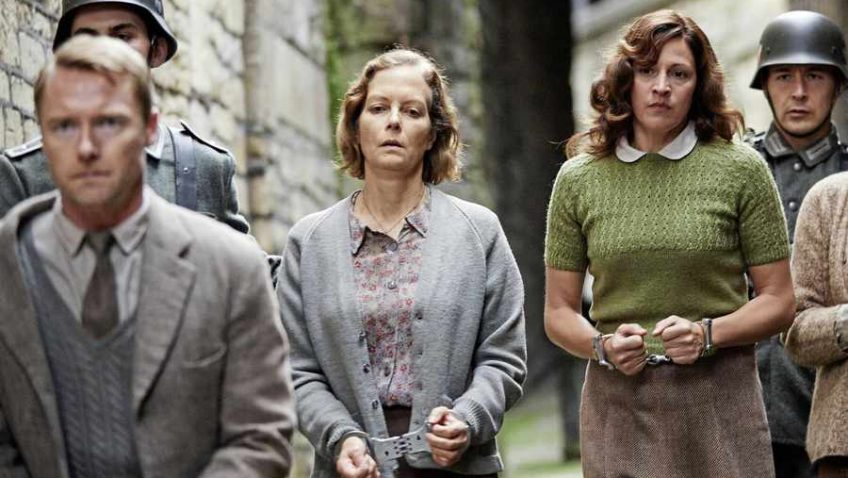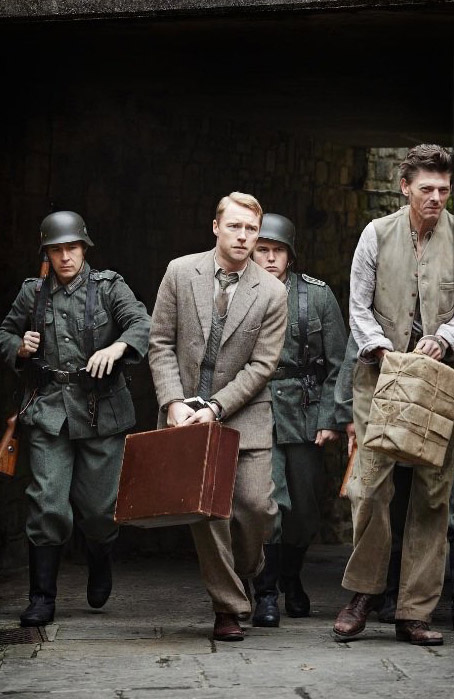Joyce Glasser reviews Another Mother’s Son (March 24, 2017) Cert. 12A, 103 min.
The opening of an unusual art exhibit at the National Portrait Gallery in London coincides with the release this week of Christopher Menaul’s Another Mother’s Son, starring Jenny Seagrove (The Guardian, An Appointment with Death, Local Hero).
In the exhibit we learn about the artist/photographer Claude Cahun, née Lucy Schwob, a French Jew and androgynous lesbian who made sexual identity a theme in her art. Cahun was living on the Isle of Jersey in 1940 when the Wehrmacht Republic successfully invaded. Active in the Resistance, where she created and distributed propaganda, in 1944 Cahun (and her life-partner) were arrested and sentenced to death. Another Mother’s Son
is about another courageous woman, also in her early fifties with a Jewish surname and French roots and living on the Isle Jersey in 1940. Louisa Gould née, Louisa Mary Le Druillenec, was also arrested in 1944 as was her brother, Harold (played in the film by Ronan Keating). Louisa’s crime was to have harboured an escaped Russian prisoner of war, one of many brought to the island to do slave work for the Nazi occupiers.
A no-nonsense, principled, but outgoing widow who runs a local grocery shop in St Ouen, Louisa Gould (Seagrove) is confident that Churchill will liberate the Channel Islands any day – and free the Russian prisoners of war whose fate she observes on an almost daily basis. When, in 1941, Gould receives the news that her son Edward was killed in action, she is not only distraught, but angry.
Several months later, a farmer finds two escaped Russian soldiers in his barn, and asks Louisa to take in one of them. Though she is frightened, Louisa imagines her own sons, and realises that she has to do something ‘for another mother’s son.’ The polite, handsome artistic Fyodr Polycarpovitch Burriy (Julian Kostov) looks like Edward ‘in a certain light’. Louisa puts him in Edward’s bedroom, gives him Edward’s clothes, calls him Bill as she cannot pronounce his Russian name and teaches him English. He draws Louisa’s portrait. Louisa’s school-teacher brother, Harold, a bachelor, gives Bill his Russian/English dictionary that Christmas.
Apart from the farmer, only Harold, their sister Ivy (Amanda Abbington), brother-in-law Arthur (John Hannah), and Ivy and Arthur’s son Rex (Brenock O’Connor) know about Bill. Though Bill seems more comfortable remaining in the house, Louisa insists that he take exercise and – perhaps in an attempt to forget wartime conditions, or to improve Bill’s quality of life – their outings become more daring.
Over the course of the 18 months during which Bill lives with Louisa, his English improves and Louisa pays for his unofficial identity papers. Soon Bill is helping out in the shop. There isn’t much to sell, however, with the increasingly harsh rationing. This creates ill-will with certain neighbours for hunger breeds resentment.
In 1995 part of the British Home Office archives on the Channel Islands in WWII were opened. They reveal the astonishing level of collaboration between the Wehrmacht and the native civil authorities as well as the public.
All islanders were vulnerable, but, particularly anyone with a Jewish sounding name. In his Essay on Anti-Semitism in Britain, published in 1945, George Orwell observed, ‘It so happens that the war has encouraged the growth of anti-Semitism and even, in the eyes of many ordinary people, given some justification for it.’
Competently written by Gould’s great niece, Jenny Lecoat, the script refers to this anti-Semitism in a scene in which Louisa is called before a German official who remarks on her Jewish name. The level of collaboration, direct or indirect, is not just confined to a young woman spurned by Louisa for dating a German soldier or to two petty, portly sisters denied special treatment during rationing. Arthur, who works at the post office, realises that some of the islanders are snitching on their neighbours, and fearing for Louisa, he steams open letters to the authorities. He keeps his activities hidden from his superior, a Mr De La Haye (Nicholas Farrell) who shows no sign of bending the rules about delivering the letters of snitchers. Mr De La Haye represents either a selfish coward or an ideological collaborator when he insists that all letters be delivered, even those addressed by islanders to the German authorities.
Lecoat’s script also allows 59-year-old Seagrove the scope to convey Louisa’s complex personality, even taking in her background, as when, in one scene, French is spoken to hide Bill’s accent. At times Louisa’s nonchalance in hiding Bill in plain sight at the shop is irritating for she risks the lives of those who trust her. While Keating’s Harold is a linguist and intellectual, Seagrove never acts (or speaks) above her station as a grocery ship owner. Seagrove never forgets she is portraying a protective mother in her irrationality and in her heroism.
Director Christopher Menaul is one of those directors who, like Amma Assante, have a knack for choosing terrific stories that is not matched by a flair for directing them. While Another Mother’s Son is an improvement on Menaul’s previous biopic, the pretentious (and misleading) Summer in February, here the direction is still pedestrian and stilted. Fortunately, there is a natural tension built into the script by its subject and circumstances. What is less fortunate is the filmmakers’ decision to truncate the harrowing consequences of Gould’s naivety, depriving us of the time and space we need to assimilate the astonishing fate of the various characters.
You can watch the film trailer here:






